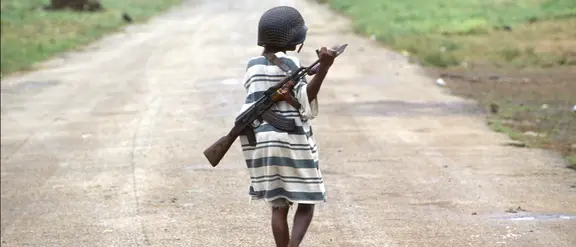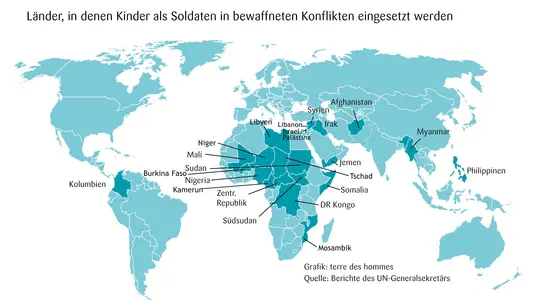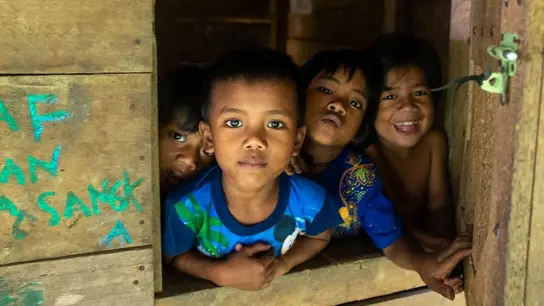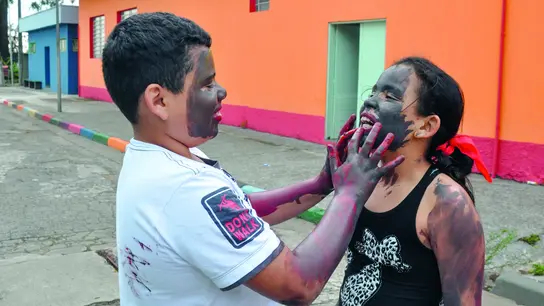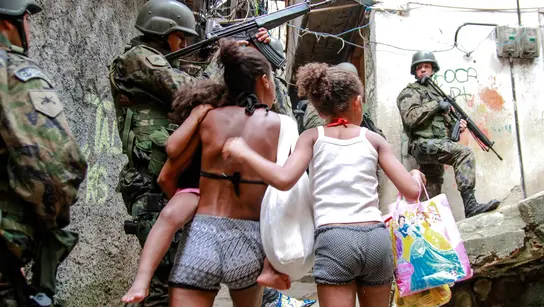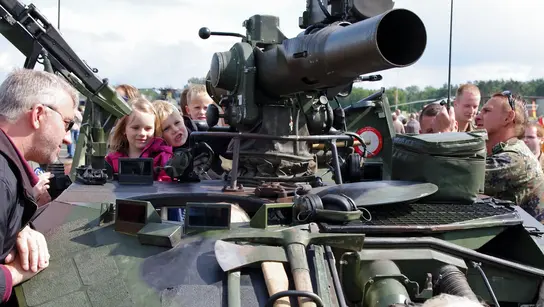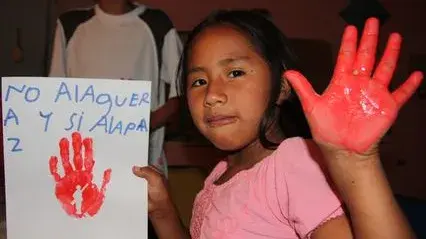They are forced to kill, sent to the front lines, driven through minefields, or used for espionage. Hundreds of thousands of children and young people are abused as soldiers in over 20 countries worldwide. They are severely traumatized and urgently need support. Join us in advocating for an end to this grave violation of children's rights and for these girls and boys to have a chance to return to civilian society.
Your donation helps!
Projects
Child soldiers - facts and figures
No recruitment of children!
They are forced to kill and plunder, sent to the front lines, driven through minefields, or used for espionage. 250,000 children and young people worldwide are abused as soldiers – by both regular armies and rebel groups. Depending on the conflict, between five and 20 percent of them are girls.
Children and teenagers are an integral part of the military infrastructure in many warring factions. Their daily lives are marked by violence, and their upbringing is based on unconditional obedience. Children are easier to manipulate and more obedient than adults; they are often drugged to make them compliant. Light and inexpensive small arms —including those from Europe—enable warlords to send even young children to the front lines.
Once the war is over, they urgently need support so they have a chance to reintegrate into civilian society. Many are traumatized and unable to support themselves. They often have neither received an education nor attended school. Terre des Hommes gives these children a new perspective: through projects, they receive psychological support and vocational training. On a political level Terre des Hommes advocates to ensure that no child under the age of 18 is recruited and that arms exports to countries with serious human rights violations and armed conflicts are stopped.
Worldwide campaign against the recruitment of children
Terre des Hommes together with Kindernothilfe, coordinates Red Hand Campaign against the exploitation of children as soldiers. Worldwide, Terre des Hommes against the abuse of children as soldiers in international networks such as the Watchlist on Children and Armed Conflict and with local partners such as Coalico in Colombia and Equality Myanmar in Southeast Asia.
definition
Child soldiers are
"... all persons under the age of 18 who are recruited or used by armed forces or armed groups (...), including children and young people who have been used as fighters, cooks, porters, messengers, spies or for sexual purposes."
Definition according to the Paris Principles (2007), signed by over 110 states, including Germany
It is estimated that worldwide recruited and used by armed groups and armies in over 20 countries. They are abducted or lured with false promises and low wages and subjected to military training. Often, they are made compliant through abuse, drugs, or money. Girls and boys are frequently sexually abused. The long-term consequences for the children's psychological and physical well-being are catastrophic: they are forced into absolute obedience, their self-confidence dwindles, they become desensitized to cruelty, and they are traumatized and suffer severe psychological damage.
In Germany , boys and girls under the age of 18 are recruited into the Bundeswehr (German Armed Forces) every year. In 2024, the total number was 2,203, a new record high, including 321 girls. According to data from the Ministry of Defense, these girls are repeatedly subjected to serious violations of children's rights within the Bundeswehr, such as sexual violence, trauma, and accidents. Germany is one of the few countries worldwide that still recruits minors as soldiers – these are considered "child soldiers" according to the international definition of the United Nations – thus providing armies and armed groups in war zones with a pretext to continue doing so. Terre des Hommes is advocating for the Bundeswehr to adhere to the international 18-year standard and to stop the recruitment and advertising of minors. The UN Committee on the Rights of the Child, the Children's Commission of the German Bundestag, and Sweden and other states within the UN Human Rights Council have long demanded this of Germany. In February 2025, Terre des Hommes together with the alliance “ Under 18 Never – No minors in the Bundeswehr! ”, presented more than 32,000 signatures to Defense Minister Boris Pistorius and emphasized the demands in a discussion.
The handover in the video250,000 children and young people are deployed as soldiers worldwide in more than 20 countries, most of them in the Middle East, Africa and Asia.
- In Syria, thousands of children were abused as soldiers by the Islamic State, the Free Syrian Army, as well as Kurdish and pro-Assad groups.
- In Colombia, following the peace agreement signed at the end of 2016, 7,000 FARC fighters, including many minors, were disarmed and demobilized in 2017. Other armed guerrilla groups, such as the ELN, ELP, FARC splinter groups, as well as paramilitary groups and criminal gangs, continue to have large numbers of underage soldiers.
- More than 8,000 children, including many girls, have been recruited by Boko Haram in Nigeria since 2009, some of them forced to blow themselves up as suicide bombers. Vigilante groups fighting against Boko Haram have also recruited hundreds of children.
- in Myanmar ; exact figures are unknown. Recruitment into the state army initially declined after the signing of a UN action plan in 2012, but has risen sharply again since 2020. Armed opposition groups such as the Kachin Independent Army (KIA) also use minors as soldiers.
- In India, numerous armed opposition groups recruit children, for example the Naxalites and many groups in Northeast India, and cases of recruitment and illegal detention of minors are also repeatedly documented within the state army. Terre des Hommes has conducted a study on this.
- also recruited and exploited as soldiers in the Democratic Republic of Congo, Cameroon, Sudan, South Sudan, Mali, Burkina Faso, Central African Republic, Mozambique, Somalia, Lebanon, Libya, Yemen, Syria, Iraq, Israel/Palestine, Afghanistan, the Philippines and other countries .
In addition to the UN Convention on the Rights of the Child and the Optional Protocol on Children and the Role of the Armed Conflict, important standards against the recruitment of children have been established. These include:
- the establishment of the International Criminal Court in The Hague, which, among other things, prosecutes the recruitment of children as a war crime
- the appointment of a UN Special Representative for Children in Armed Conflict and the establishment of a monitoring and reporting mechanism
- a debate on the situation of children and young people in decisions of the UN Security Council, in peace missions and peace agreements.
But this is far from sufficient, as many regulations are not implemented in practice. Even the most serious violations of children's rights usually have no consequences, neither under criminal law nor at the international or diplomatic level.
This culminated in June 2016 when Saudi Arabia threatened UN Secretary-General Ban Ki-moon that it would halt all payments to the UN if it was not removed from the UN's so-called "list of shame." Saudi Arabia had been placed on this list following massive bombings of hospitals and schools in Yemen, which resulted in numerous civilian deaths, including many children. Ban Ki-moon reluctantly agreed to the removal but made this blackmail public. Terre des Hommes and many other NGOs protested, but international pressure largely failed to materialize. From 2017 to 2019, the military coalition led by Saudi Arabia and the United Arab Emirates (UAE), which is waging war in Yemen, was then listed on the "list of shame" as an actor responsible for the killing and maiming of children. However, it was no longer included in the 2020 and 2021 reports, even though the military coalition continued to bomb civilian markets, schools, and hospitals, causing numerous deaths. Several human rights organizations therefore filed criminal charges in 2019 with the International Criminal Court in The Hague against European companies such as Airbus, Rheinmetall, Leonardo, and BAE Systems, as well as against state actors in Germany, France, Great Britain, Spain, and Italy, for complicity in war crimes. Members of the military coalition, especially Saudi Arabia, the United Arab Emirates, and Egypt, remain among the world's largest arms importers and are being massively rearmed, primarily by the USA, Great Britain, and Germany.
In general, there has been a very high rate of child rights violations in armed conflicts in recent years. The UN Security Council and influential countries like Germany must take urgent action and give the protection of children in war zones the highest priority.
Demands and goals
Terre des Hommes and the German Alliance Against Child Soldiers are making demands of international politics and the German government to improve the situation of child soldiers.
1. “Straight 18”
Children under 18 years of age may not be recruited, either voluntarily or forcibly, or deployed as soldiers. This applies regardless of their role and whether they carry a weapon. All girls and boys under 18 must be discharged from armies and armed groups. Furthermore, it is generally prohibited to recruit those under 18 into armies or armed groups. This also applies to the German Armed Forces (Bundeswehr ), which continues to recruit 17-year-olds and advertise among schoolchildren.
2. Punishment of those responsible
: States and armed groups that recruit and use children as soldiers must be publicly named and punished.
3. Care, protection and assistance for escaped child soldiers:
Medical and psychological care, protection from re-recruitment, as well as school and vocational education are vital for all former child soldiers - especially when they come to other countries as refugees.
4. Granting political asylum
: Former child soldiers must be granted protection and political asylum in all countries to which they have fled – including Germany and other industrialized countries.
5. Stop arms exports to countries with armed conflicts or serious human and children's rights violations - especially to countries where one of the six serious children's rights violations takes place in armed conflicts (according to the UN definition: the recruitment of children as soldiers, the killing and maiming of children, the abduction of children, sexual violence against children, attacks on schools and hospitals, denial of access to humanitarian aid).
6. More money for child soldier aid programs
Government and international funding for prevention and reintegration programs for child soldiers must be significantly increased. Many countries with child soldiers have no funding whatsoever for such programs.
Under 18s never! This should also apply German Armed Forces.
1. Stop recruiting 17-year-old minors into the German Armed Forces, raise the minimum age for recruitment to 18 years.
2. Stop advertising by the German Armed Forces that specifically targets minors: in schools, in youth media, on youth websites, at sports, adventure and music events for minors, etc.
3. peace education a mandatory part of curricula and teacher training.
4. Granting political asylum and support to refugee child soldiers or minors who have fled recruitment. Secure residency status, medical and psychological care, as well as school and vocational training are vital for them. There are major problems in this area in Germany.
5. Stop arms exports to countries with armed conflicts or serious human and children's rights violations - especially to countries where one of the six serious children's rights violations takes place in armed conflicts (according to the UN definition: the recruitment of children as soldiers, the killing and maiming of children, the abduction of children, sexual violence against children, attacks on schools and hospitals, denial of access to humanitarian aid).
6. More money for child soldier aid programs : Government funding for prevention and reintegration programs for child soldiers in crisis regions must be significantly increased.
What you can do
Terre des Hommes works on various levels to protect children in armed conflicts. In addition to participating in initiatives against child recruitment Terre des Hommes supports numerous projects in war zones and crisis areas. The following aspects are important in Terre des Hommes ' project work:
- Prevention work, i.e., the protection of children from violence and forced recruitment
- Efforts towards release, rehabilitation and reconciliation for active or former child soldiers
- Help and support for injured and traumatized former child soldiers
- Aid for former child soldiers who come to Germany as refugees
Please support our work against the abuse of child soldiers with a donation. Every donation helps!
Your contact person

Ralf Willinger
Speaker on Children's Rights and Peace Culture

Olivier Moliner
Speaker Advocacy
